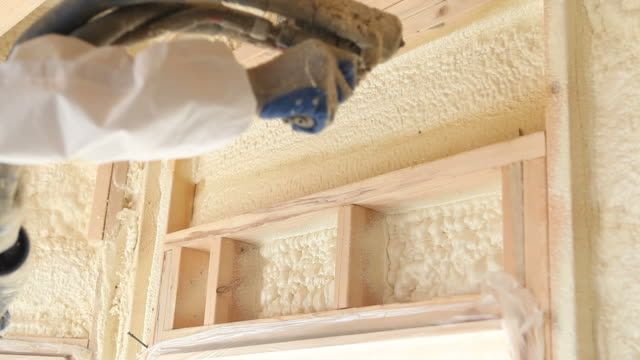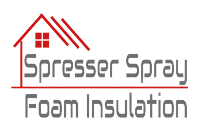Spray Foam Insulation for Commercial Warehouses: Efficient and Economical
The Importance of Commercial Warehouse Insulation

Commercial warehouses play a pivotal role in the logistics and supply chain management of businesses across various industries. These expansive structures are tasked with storing, protecting, and managing a wide range of products and materials. One of the critical factors that determine the functionality and efficiency of commercial warehouses is insulation. Proper insulation not only contributes to maintaining consistent internal temperatures but also plays a vital role in energy efficiency and cost savings. Spray foam insulation has emerged as a favored choice for commercial warehouses, offering an efficient and economical solution. In this comprehensive guide, we will explore how spray foam insulation benefits commercial warehouses, enhancing energy efficiency and delivering cost-effective insulation solutions.
Commercial warehouses are essential components of the modern supply chain, ensuring the safe storage of goods and materials. They are used in various industries, including manufacturing, distribution, and e-commerce. Efficient warehouse operations are directly linked to profitability, and insulation plays a key role in ensuring these operations run smoothly.
The critical aspects of commercial warehouse insulation include:
Temperature Control: Many products and materials require specific temperature conditions for storage. Insufficient insulation can result in temperature fluctuations that may damage or compromise the quality of stored items.
Energy Efficiency: Managing a large warehouse space efficiently is challenging. Effective insulation contributes to lower heating and cooling costs, ultimately reducing operational expenses.
Comfort for Workers: A well-insulated warehouse provides a comfortable working environment for employees. This not only enhances productivity but also contributes to their well-being.
Product Preservation: Proper insulation helps protect stored items from extreme temperatures and humidity, ensuring their quality and longevity.
Energy Conservation: Reducing energy consumption aligns with sustainability goals and is increasingly important for companies seeking to reduce their carbon footprint.
The Role of Spray Foam Insulation
Spray foam insulation is a unique insulation material that offers several advantages for commercial warehouses. It is composed of two primary components: polyurethane and isocyanate. These components are combined and sprayed onto surfaces, where they expand and harden, forming an effective insulating barrier. There are two primary types of spray foam insulation: open-cell and closed-cell, each with distinct characteristics and applications.
Open-Cell Spray Foam Insulation:
Lower density and less rigid than closed-cell foam.
Provides excellent soundproofing properties, making it suitable for commercial spaces where noise control is important.
Offers thermal insulation with a lower R-value compared to closed-cell foam.
Has some flexibility, making it suitable for areas that may experience slight structural movement.
Closed-Cell Spray Foam Insulation:
Higher density and rigid, offering greater structural support.
Provides superior thermal insulation with a higher R-value, making it more effective in extreme temperature control.
Acts as a moisture barrier, preventing water infiltration.
Offers air-sealing qualities, creating an airtight barrier.
Both open-cell and closed-cell spray foam insulation types have their advantages and are suitable for various applications. The choice between them depends on the specific requirements of the commercial warehouse.
Benefits of Spray Foam Insulation in Commercial Warehouses
Energy Efficiency: Spray foam insulation creates an airtight barrier, minimizing heat transfer. This results in reduced heating and cooling costs, making it more energy-efficient for commercial warehouses. A well-insulated warehouse can maintain consistent indoor temperatures, ensuring stored items are protected.
Thermal Comfort: Employees working in the warehouse benefit from a comfortable working environment. Spray foam insulation maintains consistent indoor temperatures, ensuring warehouse staff are not subjected to uncomfortable temperature fluctuations.
Sound Control: Open-cell spray foam insulation is particularly effective at reducing noise, making it ideal for commercial warehouses. It helps create a quieter and more pleasant working environment.
Moisture and Mold Resistance: Closed-cell spray foam insulation acts as a moisture barrier, preventing water infiltration and moisture-related issues. This protection is essential for preserving products and maintaining a healthy warehouse environment.
Product Preservation: Proper insulation helps protect stored items from extreme temperatures and humidity, ensuring the quality and longevity of products.
Increased Sustainability: Many companies are now emphasizing sustainability. Spray foam insulation can contribute to a lower carbon footprint by reducing energy consumption, making it an appealing choice for environmentally conscious businesses.
Quick Installation: Spray foam insulation can be applied quickly and efficiently, minimizing disruptions to warehouse operations during installation.
Longevity and Durability: Properly installed spray foam insulation can last for many years without needing replacement or significant maintenance.
Installing Spray Foam Insulation in Commercial Warehouses
The installation of spray foam insulation in commercial warehouses is a specialized process that should be carried out by experienced professionals. The steps involved in the installation process include:
Assessment: An insulation contractor assesses the warehouse to determine the scope of the project, including the areas that require insulation.
Preparation: The installation area is prepared by removing any existing insulation or debris and ensuring that surfaces are clean and dry.
Application: The spray foam insulation is applied using specialized equipment. It expands upon application, filling voids
Curing: The insulation cures and hardens within a short period, usually within 24 hours.
Trimming: Excess foam is trimmed to ensure a clean and even finish.
Final Inspection: The contractor conducts a final inspection to ensure the insulation is properly installed and provides the desired insulation properties.
Selecting an experienced insulation contractor is crucial to ensure a successful installation. It's advisable to obtain multiple quotes and check references before choosing a contractor for your project.
Cost Considerations
The cost of spray foam insulation installation can vary depending on factors such as the type of foam used (open-cell or closed-cell), the size of the warehouse, and any specific requirements. While the initial investment may be higher than traditional insulation materials like fiberglass, businesses can recoup these costs through energy savings and the improved working environment for employees.
Maintaining Spray Foam Insulation
Proper maintenance of spray foam insulation is essential to ensure its longevity and continued performance. Here are some maintenance tips for commercial warehouses:
Regular Inspections: Periodically inspect the insulation for any signs of damage or degradation. Address any issues promptly to prevent further damage.
Routine Cleaning: Keep the insulation surfaces clean and free from dust and debris. Regular cleaning helps maintain its effectiveness.
Seal Gaps and Cracks: Ensure that any gaps or cracks in the insulation are sealed to maintain an airtight barrier.
Monitor Moisture Levels: Keep an eye on moisture levels in the warehouse and address any humidity issues promptly to prevent moisture-related problems.
Reapply if Necessary: In the event of significant damage or wear and tear, consider reapplying spray foam insulation in affected areas.
Spray foam insulation is a valuable asset for commercial warehouses, offering an efficient and economical solution. It addresses the unique needs of these spaces, including temperature control, soundproofing, moisture resistance, and product preservation. By choosing spray foam insulation, businesses can create a comfortable and efficient working environment for employees while optimizing energy efficiency and reducing operational costs.
To fully benefit from spray foam insulation, it's essential to work with experienced insulation professionals who can ensure proper installation and maintenance. With the right insulation solution, commercial warehouses can maintain product quality, conserve energy, and provide a comfortable working environment for their employees, ultimately contributing to their success in today's competitive market.
SPEAK TO A TEAM MEMBER TODAY

All Rights Reserved | Spresser Spray Foam Insulation
Website Managed by
Leads By Vinny